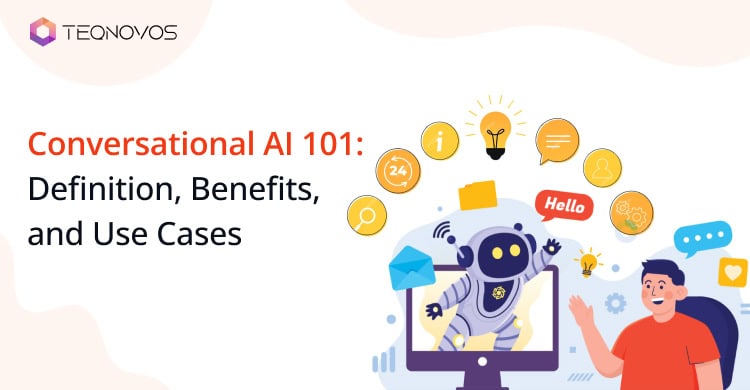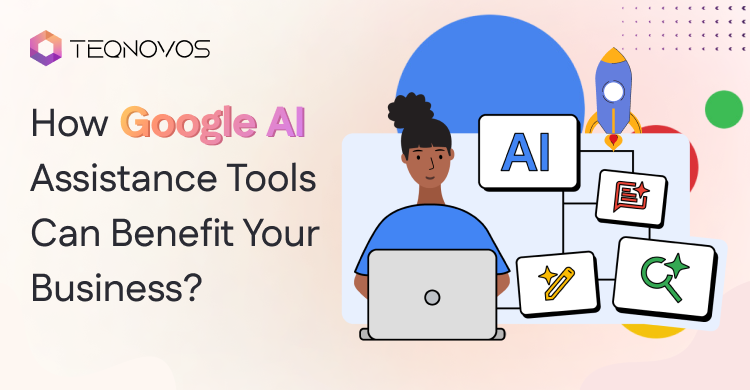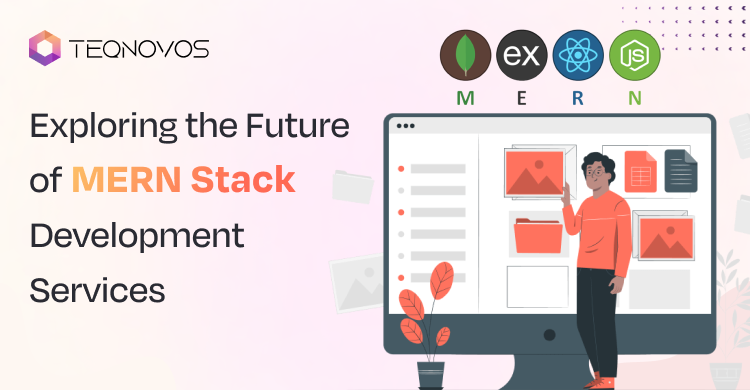Conversational AI 101: Definition, Benefits, and Use Cases
The fusion between human intelligence and AI capabilities has given rise to several innovative and futuristic technologies. Conversational artificial intelligence is one of these technologies that has revolutionized how businesses perform different functions to achieve maximum productivity.
As per market statistics, about 80% of CEOs have altered or plan to alter their client engagement models as per conversational AI technologies. If you also want to make the most of this latest technology, it’s time for you to learn what conversational AI is.
In this detailed blog, we will discuss the definition of conversational AI, some of its prime benefits, and use cases. Find out all about conversational AI here.
What is Conversational AI: Overview
Conversational AI is the next-gen artificial intelligence technology that involves developing computer programs that generate natural human-like responses. This tech enhances a software application’s capabilities to understand and engage in interactive conversations with humans.
By leveraging natural language understanding (NLU) and machine learning, conversational AI can recognize speech and text inputs to produce relevant responses. This AI technology is primarily used to develop intelligent bots to communicate with humans.
One of the most popular examples of this technology is conversational AI chatbots that are used across businesses. These chatbots enable enterprises to establish an automated customer support system that can decipher and respond to customer queries on its own.
5 Chief Benefits of Conversational AI
Conversational AI offers a plethora of benefits to modern businesses that are proving to be a game-changer. Software solutions powered by Conversational artificial intelligence are faster, more accurate, and more advanced than traditional AI technologies.
The following are some of the top benefits of conversational AI that will help you take your business to the next level. Learn more about these benefits now.
1. Enhance Customer Engagement and Satisfaction
With conversational artificial intelligence, it has become significantly convenient for businesses to offer real-time responses to their customers. This means by opting for this technology, users can get relevant answers to their queries without wasting much time.
Hence, with assistance from this immediate AI support, your customers will feel more engaged with your brand leading to enhanced satisfaction. Conversational AI tools comprehend each customer’s unique requests and identify patterns to come up with custom responses.
2. Cost-Effective Customer Management
Hiring a customer support team for 24/7 customer service is a costly affair. This is why conversational AI is a smarter choice as it allows you to set up a support service cost-effectively. Conversational AI ensures that you don’t have to pay salaries to round-the-clock employees.
Once you build your AI chatbots powered by conversational AI, you don’t have to worry about recurring operational costs and unnecessary expenses. Plus, you are not required to train or manage these tools which results in greater savings and increased productivity.
3. Increase Sales with Proactive Support
Given how competitive the market is, the only way for businesses to drive more sales is by being proactive. Conversational AI chatbots are a great way for you to take proactive measures for your business’s long-term profitability. These AI tools help you get more sales and profit.
With conversational artificial intelligence, you not only engage customers but take a proactive approach to influence their decisions. A reliable conversational AI tool can track a customer’s shopping history to understand their shopping habits and offer precise product recommendations.
4. Multilingual and Omnichannel Service
As more enterprises look to expand their business globally, the need for a multilingual customer support service also increases. Fortunately, conversational AI assists businesses in connecting with customers from different parts of the world and conversing with them in their language.
When you address customers in their native language, you have a higher chance of building customer loyalty. Since conversational AI bots offer omnichannel support through websites, social media, etc., it becomes even simpler to foster a trusting relationship.
5. Data-driven Decision Making
The role of conversational AI in a business environment is not limited to prompt responses to customer queries. Instead, this artificial intelligence technology is also helpful in making data-driven business decisions that promote better personalization.
With each interaction that this tool has with your users, they understand their pain points and preferences immediately. This information proves valuable in helping you make decisions and strategies that cater to your target audience’s unique needs.
Top Conversational AI Use Cases You Must Know About
Conversational AI is a lucrative technology with extensive real-world applications for modern businesses. Are you aware of some of the most popular use cases of conversational artificial intelligence? If not, then you are in the right place.
Here, we will list the top use cases of conversational AI that you must know about as a business owner. Go through these, and implement them in your business today.
1. Customer Service
The first and perhaps the most obvious use case of conversational AI is customer service. These new-age tools can automate a company’s entire customer support service. Everything is done by this AI tech, from greeting customers to listening to queries and generating responses.
Today, many businesses custom-build chatbots for their company and use them across platforms to connect with customers. This not only helps them save time but also improves customer satisfaction simultaneously. Conversational artificial intelligence customer service proves beneficial for both the company and the customers.
2. Internet of Things (IoT) Devices
In case you don’t know, Internet of Things (IoT) devices are the gadgets that we use in our daily lives. From our mobile phones to tablets, and virtual assistant devices like Alexa, all fall under the Internet of Things. These gadgets contain sensors that collect and send real-time data.
These IoT sensors are powered by conversational AI technology and are used for different purposes. For example, IoT devices can be used in the healthcare sector to track patient’s vitals or diagnose medical problems.
3. Marketing
Businesses today are also using conversational AI solutions for their marketing campaigns. Since these tools use existing market data to generate relevant suggestions, they prove vital in creating success-driven marketing strategies.
A conversational AI tool will discover patterns in your customer’s shopping preferences to determine what’s trending in the market. Based on that, the tool will share insights with you that you can further implement in your marketing plans, and attract more customers.
To Sum It Up
Whether you want to learn the definition of conversational AI or know about its top benefits, this blog is for you. We have put together a comprehensive guide on conversational AI that will help you know all the important things about it. Here, we have also listed some of its use cases.
Automating customer service, augmenting marketing efforts, and accurate data collection are some of the popular conversational AI use cases. Therefore, as a business leader, you must harness the power of the latest conversational AI tech to give your business a competitive edge.
Teqnovos is one of the top AI development companies where you can hire the best AI developers. Our experts can help you integrate conversational AI technologies into your applications and make the most of them for faster business growth. Get your appointment now.
Frequently Asked Questions
1. What is a key differentiator of conversational AI?
The key differentiator of conversational artificial intelligence that sets it apart from traditional chatbots is the implementation of natural language processing (NLP). Conversational AI applications can understand human languages precisely and can indulge in effective human-like conversations. With its advanced NLP techniques, conversational AI apps can understand the context and user intent while generating responses. This is what makes conversational AI unique and a promising tech to implement in your business process.
2. How does conversational AI work?
Natural language processing and machine learning technologies power modern conversational AI chatbots. These techs allow the AI application to receive inputs in human language and translate them into data that the tool can understand. Conversational AI breaks down shared inputs, identifies patterns, and generates the most suitable responses. As more people use conversational AI tools, the more it learns from past interactions and gets even better.
3. What are the benefits of using conversational AI for business?
There are many benefits of conversational AI for your business. This AI tech responds to customer queries quickly and accurately, enhancing overall customer satisfaction. Additionally, conversational AI provides businesses with data-driven insights about each customer making it easier for them to personalize the shopping experience for customers. Lastly, conversational AI is 24/7 available for instant support which eventually leads to increased sales.
4. What are the types of conversational AI?
Conversational AI is a vast field of artificial intelligence further divided into different types. Some of these popular types of conversational AI are chatbots, virtual assistants, voice bots, and automated messaging systems. Each one of these systems is powered by conversational AI and offers different functions across businesses. Based on your requirements, you can custom-build a conversational AI application with the help of professional AI developers. Just make sure that you hire reliable experienced AI developers from a reputed company.
















